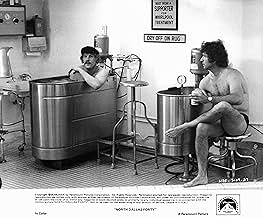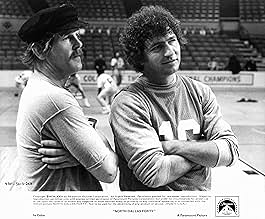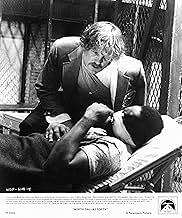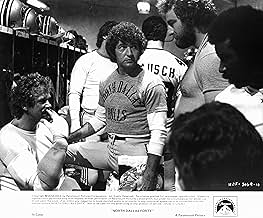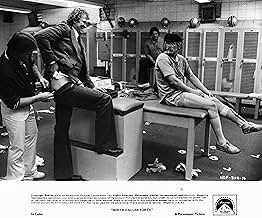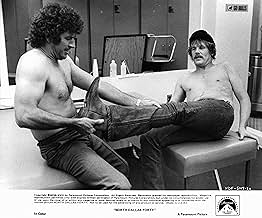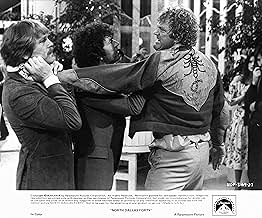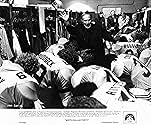IMDb-BEWERTUNG
6,9/10
6305
IHRE BEWERTUNG
Eine Satire auf den American Professional Football in.Eine Satire auf den American Professional Football in.Eine Satire auf den American Professional Football in.
- Auszeichnungen
- 1 Gewinn & 2 Nominierungen insgesamt
Savannah Smith Boucher
- Joanne Rodney
- (as Savannah Smith)
Alan Autry
- Balford
- (as Carlos Brown)
Empfohlene Bewertungen
The opening shot of Ted Kotcheff's North Dallas Forty is a tense and memorable one. It shows the aging and exhausted Phil Elliot (Nick Nolte), passed out in his bed and awoken by a blaring alarm clock. Elliot is slow to get up, every move being a slow one that clearly causes a searing amount of pain. He lumbers to the kitchen to get a beer before stumbling to soak in a bathtub. Punctuating this scene are brief little clips from last night's football game, where Elliot was met with several rough, polarizing blows to every part of his body. Interrupting this scene's quiet, almost meditative atmosphere are Elliot's loudmouth friends, clearly intoxicated, who want to go out and cause a ruckus with their shotguns.
What we see in the first few minutes of North Dallas Forty are what we never see in sports - the morning after the game. The physical pain rather than the heated press conferences or celebratory events in the locker. Because we see the lead character in such a vulnerable, often powerless light despite being a very good football player is why North Dallas Forty is so skilled on its feet as a film. It explores where other films would dim their focus. It fully embraces and boldly depicts in element where other screenwriters' knees would buckle under the weight and pressure of the story, especially for the time. Written by a trio of thoughtful and thoroughly ambitious people - Peter Gent, Kotcheff, and Frank Yablans - the film manages to be less entertaining and sensational, like a typical sports film, and more heartbreaking and an often immersing watch.
We set our sights on Elliot, who is becoming greatly dissatisfied with the way the NFL operates (his team is the fictional North Dallas Bulls, which mirror the Dallas Cowboys, FYI). He loathes the way managers and coaches treat their players like cattle, constantly emphasizing their flaws and not their advantages, and justifying their ungrateful, smug comments on poor performance as methods of tough-love. Elliot knows the organization is out to make money and injuries, long-term trauma, and player wellbeing are the least of their concerns. Through Elliot's dissatisfaction, however, he becomes heavily dependent on painkillers, alcohol, and other pills of sorts to keep his mind right. Just before a big game that determines the Bulls' playoff fate, Elliot's leg, which is experiencing hellish pain, is given a shot of a mysterious substance. What was it? What are its effects? Why is it being used? Who cares, "the whole thing's numb," Elliot states.
The film is held together not only by the competence of its writer but by Nolte's tremendous talents as a character actor and performing. He articulates with a touch of sensitivity and years of craft the agony and despair many aging athletes likely experience. For instance, consider Super Bowl XLVIII, which took place yesterday and ended with the Seattle Seahawks winning 43 - 8 over the two-point favorite Denver Broncos, led by Quarterback Peyton Manning, who is already thirty-seven years old with years of professional experience under his belt. I wouldn't want to feel what that man has felt waking up, especially now, nearing forty with the albatross of having numerous neck surgeries conducted. Watching the Super Bowl last night, I could only imagine how he not just him but many of those players wake up with severe pain in their bodies - pain that will likely carry over to their older years and maybe even cripple them as time goes on. All for a game that will be out of the immediate mindset of even the most heartened-fans in no more than two weeks or so.
On a final note, the promotional poster/home video release images for North Dallas Forty are criminally misleading ones, showing two football players, one dousing himself with water, the other hoisting his helmet while they both lounge in two cowboy boots with two woman grappling to get at them on both sides of the boots. The image at hand denotes a fun sort of rabble-rousing, Animal House-style entertainment which is completely absent from the film. This is not the film you will see, and the marketing campaign has shamefully misrepresented the film to consumers if their sole-exposure to the film is by looking at the film's promotional poster or home video cover.
Starring: Nick Nolte, Mac Davis, and Charles Durning. Directed by: Ted Kotcheff.
What we see in the first few minutes of North Dallas Forty are what we never see in sports - the morning after the game. The physical pain rather than the heated press conferences or celebratory events in the locker. Because we see the lead character in such a vulnerable, often powerless light despite being a very good football player is why North Dallas Forty is so skilled on its feet as a film. It explores where other films would dim their focus. It fully embraces and boldly depicts in element where other screenwriters' knees would buckle under the weight and pressure of the story, especially for the time. Written by a trio of thoughtful and thoroughly ambitious people - Peter Gent, Kotcheff, and Frank Yablans - the film manages to be less entertaining and sensational, like a typical sports film, and more heartbreaking and an often immersing watch.
We set our sights on Elliot, who is becoming greatly dissatisfied with the way the NFL operates (his team is the fictional North Dallas Bulls, which mirror the Dallas Cowboys, FYI). He loathes the way managers and coaches treat their players like cattle, constantly emphasizing their flaws and not their advantages, and justifying their ungrateful, smug comments on poor performance as methods of tough-love. Elliot knows the organization is out to make money and injuries, long-term trauma, and player wellbeing are the least of their concerns. Through Elliot's dissatisfaction, however, he becomes heavily dependent on painkillers, alcohol, and other pills of sorts to keep his mind right. Just before a big game that determines the Bulls' playoff fate, Elliot's leg, which is experiencing hellish pain, is given a shot of a mysterious substance. What was it? What are its effects? Why is it being used? Who cares, "the whole thing's numb," Elliot states.
The film is held together not only by the competence of its writer but by Nolte's tremendous talents as a character actor and performing. He articulates with a touch of sensitivity and years of craft the agony and despair many aging athletes likely experience. For instance, consider Super Bowl XLVIII, which took place yesterday and ended with the Seattle Seahawks winning 43 - 8 over the two-point favorite Denver Broncos, led by Quarterback Peyton Manning, who is already thirty-seven years old with years of professional experience under his belt. I wouldn't want to feel what that man has felt waking up, especially now, nearing forty with the albatross of having numerous neck surgeries conducted. Watching the Super Bowl last night, I could only imagine how he not just him but many of those players wake up with severe pain in their bodies - pain that will likely carry over to their older years and maybe even cripple them as time goes on. All for a game that will be out of the immediate mindset of even the most heartened-fans in no more than two weeks or so.
On a final note, the promotional poster/home video release images for North Dallas Forty are criminally misleading ones, showing two football players, one dousing himself with water, the other hoisting his helmet while they both lounge in two cowboy boots with two woman grappling to get at them on both sides of the boots. The image at hand denotes a fun sort of rabble-rousing, Animal House-style entertainment which is completely absent from the film. This is not the film you will see, and the marketing campaign has shamefully misrepresented the film to consumers if their sole-exposure to the film is by looking at the film's promotional poster or home video cover.
Starring: Nick Nolte, Mac Davis, and Charles Durning. Directed by: Ted Kotcheff.
Seen this movie a few times on TV and it is a superb football film. Nick Nolte is excellent as the gruff and rough guy with lots of problems on and off the football field. Being in the 70's makes it even better and more realistic. Made in a time when men where men and sports meant more than money, a lot more. Sex, booze, knocking heads and blood & tears is what make these players happy! Good, fun all round film with great thought put into the story especially when entering Nolte's problems with team management/owners. As we all know deep rifts and problems occur between sports players and club owners but we never get to really know the truth and what goes on in the boardroom and player meetings. This film gives us a little make look at what could or should I say happens! I enjoyed this film very much,love the music, great characters and a good story. A winner all around.
"North Dallas Forty" can rightfully take its place among the greatest of sports based movies. It's an intelligent, unflinching look into the world of professional (American) football, and the assortment of characters that inhabit the world. There's no need for flashy filmmaking here; the drama is strong enough to carry the story, along with some completely authentic performances. People unfamiliar with this movie will note that there's not necessarily a lot of game action; the concentration is on the action taking place off the playing field.
The pivotal character is Phillip Elliott (Nick Nolte), a weary seen-it-all veteran of the game, a top notch receiver conscious of all the punishment that his body has taken over the years. Phillip knows the game very well, but he's not too interested in playing a different sort of game, with the hard-driving coaches (G.D. Spradlin and Charles Durning) and the greedy team owner (Steve Forrest). Fortunately, he does have one good friend: star quarterback Seth Maxwell (singer Mac Davis).
This is scripted by director Ted Kotcheff ("First Blood"), producer Frank Yablans, and author Peter Gent, who wrote the semi-fictional novel on which the movie is based. Based on the Dallas Cowboys team of the early 1970s, it takes its time telling the story, contrasting the more philosophical and low key nature of Phillip with gung-ho defensive players like O.W. Shaddock (real life football star John Matuszak) and Jo Bob Priddy (amusing live wire Bo Svenson). We feel completely sympathetic towards Phillip, and can also practically feel the pain that he experiences after every game. There are several key emotional scenes, especially towards the end.
Nolte is excellent in the lead role, and as one can see, the supporting cast is full of rock solid actors (also among them is Dabney Coleman as Forrests' younger brother). Nolte and Davis have very fine chemistry and one can buy them as friends. Dayle Haddon, as a love interest for Nolte, isn't terribly effective because she comes off as just too aloof.
Compelling material, even for people who aren't necessarily football fans.
Eight out of 10.
The pivotal character is Phillip Elliott (Nick Nolte), a weary seen-it-all veteran of the game, a top notch receiver conscious of all the punishment that his body has taken over the years. Phillip knows the game very well, but he's not too interested in playing a different sort of game, with the hard-driving coaches (G.D. Spradlin and Charles Durning) and the greedy team owner (Steve Forrest). Fortunately, he does have one good friend: star quarterback Seth Maxwell (singer Mac Davis).
This is scripted by director Ted Kotcheff ("First Blood"), producer Frank Yablans, and author Peter Gent, who wrote the semi-fictional novel on which the movie is based. Based on the Dallas Cowboys team of the early 1970s, it takes its time telling the story, contrasting the more philosophical and low key nature of Phillip with gung-ho defensive players like O.W. Shaddock (real life football star John Matuszak) and Jo Bob Priddy (amusing live wire Bo Svenson). We feel completely sympathetic towards Phillip, and can also practically feel the pain that he experiences after every game. There are several key emotional scenes, especially towards the end.
Nolte is excellent in the lead role, and as one can see, the supporting cast is full of rock solid actors (also among them is Dabney Coleman as Forrests' younger brother). Nolte and Davis have very fine chemistry and one can buy them as friends. Dayle Haddon, as a love interest for Nolte, isn't terribly effective because she comes off as just too aloof.
Compelling material, even for people who aren't necessarily football fans.
Eight out of 10.
I hadn't seen ND40 since it first opened, but I always remembered it as my favorite football movie. Since my friends are sick of me comparing every football movie to it, I decided to make sure I was still right after 20 years. The movie holds up remarkably over the years. Sure, lots has changed--making the movie a humorous period statement. The bad hair, the bad polyester clothes, and cigarettes everywhere. The coach actually has to tell the team to put out their cigarettes five minutes before the big game!
On substance, the movie is still right on the mark. The addiction to pain killers, the crippling effect of the game, and the effect the game has on the players personal lives all ring true today. Although we try to unsuccessfully bury some of those problems today, they sneak out anyway in Bret Favre's pain killers or OJ Simpson's arthritis.
One problem: if Nolte really is the best receiver on the team with the best hands in the league, why isn't he playing? I can hypothesize reasons, but the writer/director could have made the reasons more obvious.
9 stars out of 10
On substance, the movie is still right on the mark. The addiction to pain killers, the crippling effect of the game, and the effect the game has on the players personal lives all ring true today. Although we try to unsuccessfully bury some of those problems today, they sneak out anyway in Bret Favre's pain killers or OJ Simpson's arthritis.
One problem: if Nolte really is the best receiver on the team with the best hands in the league, why isn't he playing? I can hypothesize reasons, but the writer/director could have made the reasons more obvious.
9 stars out of 10
This post Hippie, late seventies, anti establishment film (the establishment in question being corporate sports) has a few problems but is mostly an enjoyable and at times powerful look at by far the most brutal of American athletic obsessions. It is especially good when employing locker room humor and disturbing, locker room detail to get at the pain and raunch that are at the center of football culture. Mac Davis' wonderfully scatological tale of the corruption of a religious QB is alone worth the price of admission. And the stuff involving needles, pills, and agonizing physical discomfort at times borders on the harrowing. As do the scenes on the football field, both in practice and actual games.
Where the film loses its edge, in my opinion, is when it gets up on its soapbox and pushes the very tired trope of the Evil Owners versus the Downtrodden Players. Not only were football players, even in the 1970s, paid way too much to be downtrodden but the speechifying from Nick Nolte and John Matuszak in the film's last third really slows down the action and takes what had been a fairly unpretentious movie into heavy, message laden waters. I also wearied of Nolte's character, modeled on Peter Gent upon whose novel the film is based. There is about him a general, unattractive air of elitism and superciliousness, especially evident at the orgy scene, where you can almost hear him bemoaning the fact that he, the reader of books and dater of intelligent brunettes, must suffer the company of these savages and their blonde bimbos. The character played by Mac Davis, by contrast, based on Don Meredith, is much more appealing in his combination of virtues (a wicked sense of humor and general perceptiveness about the folly of humanity) and flaws (a very elastic morality that easily embraces corruption). Indeed, if this Ted Kotcheff film had concentrated on the always uneasy Davis/Nolte friendship, instead of the evils of corporate sports, it might have had a chance at greatness. As it is, let's give it a B minus.
Where the film loses its edge, in my opinion, is when it gets up on its soapbox and pushes the very tired trope of the Evil Owners versus the Downtrodden Players. Not only were football players, even in the 1970s, paid way too much to be downtrodden but the speechifying from Nick Nolte and John Matuszak in the film's last third really slows down the action and takes what had been a fairly unpretentious movie into heavy, message laden waters. I also wearied of Nolte's character, modeled on Peter Gent upon whose novel the film is based. There is about him a general, unattractive air of elitism and superciliousness, especially evident at the orgy scene, where you can almost hear him bemoaning the fact that he, the reader of books and dater of intelligent brunettes, must suffer the company of these savages and their blonde bimbos. The character played by Mac Davis, by contrast, based on Don Meredith, is much more appealing in his combination of virtues (a wicked sense of humor and general perceptiveness about the folly of humanity) and flaws (a very elastic morality that easily embraces corruption). Indeed, if this Ted Kotcheff film had concentrated on the always uneasy Davis/Nolte friendship, instead of the evils of corporate sports, it might have had a chance at greatness. As it is, let's give it a B minus.
Wusstest du schon
- WissenswertesThis movie was made and released about six years after its source semi-autobiographical novel of the same name by Peter Gent was published in 1973. The name of the football team in the movie is the North Dallas Bulls, loosely based on the real-life NFL Dallas Cowboys, for whom Gent played between 1964 and 1968.
- PatzerWhen Phil is walking into Conrad Hunter's office building which is supposedly in Dallas, the Westin Bonaventure Hotel is plainly visible. This hotel is in Los Angeles and is an iconic building of five glass cylindrical towers.
- Zitate
O. W. Shaddock: Every time I call it a game, you call it a business, and every time I call it business, you call it a game.
- SoundtracksCuba
Performed by The Gibson Brothers
Written by Jean Kluger & Daniel Vangarde
courtesy of Island Records
Top-Auswahl
Melde dich zum Bewerten an und greife auf die Watchlist für personalisierte Empfehlungen zu.
- How long is North Dallas Forty?Powered by Alexa
Details
- Erscheinungsdatum
- Herkunftsland
- Sprache
- Auch bekannt als
- North Dallas Forty
- Drehorte
- Los Angeles, Kalifornien, USA(Conrad Hunter's Building)
- Produktionsfirmen
- Weitere beteiligte Unternehmen bei IMDbPro anzeigen
Box Office
- Bruttoertrag in den USA und Kanada
- 26.079.312 $
- Weltweiter Bruttoertrag
- 26.079.312 $
Zu dieser Seite beitragen
Bearbeitung vorschlagen oder fehlenden Inhalt hinzufügen


